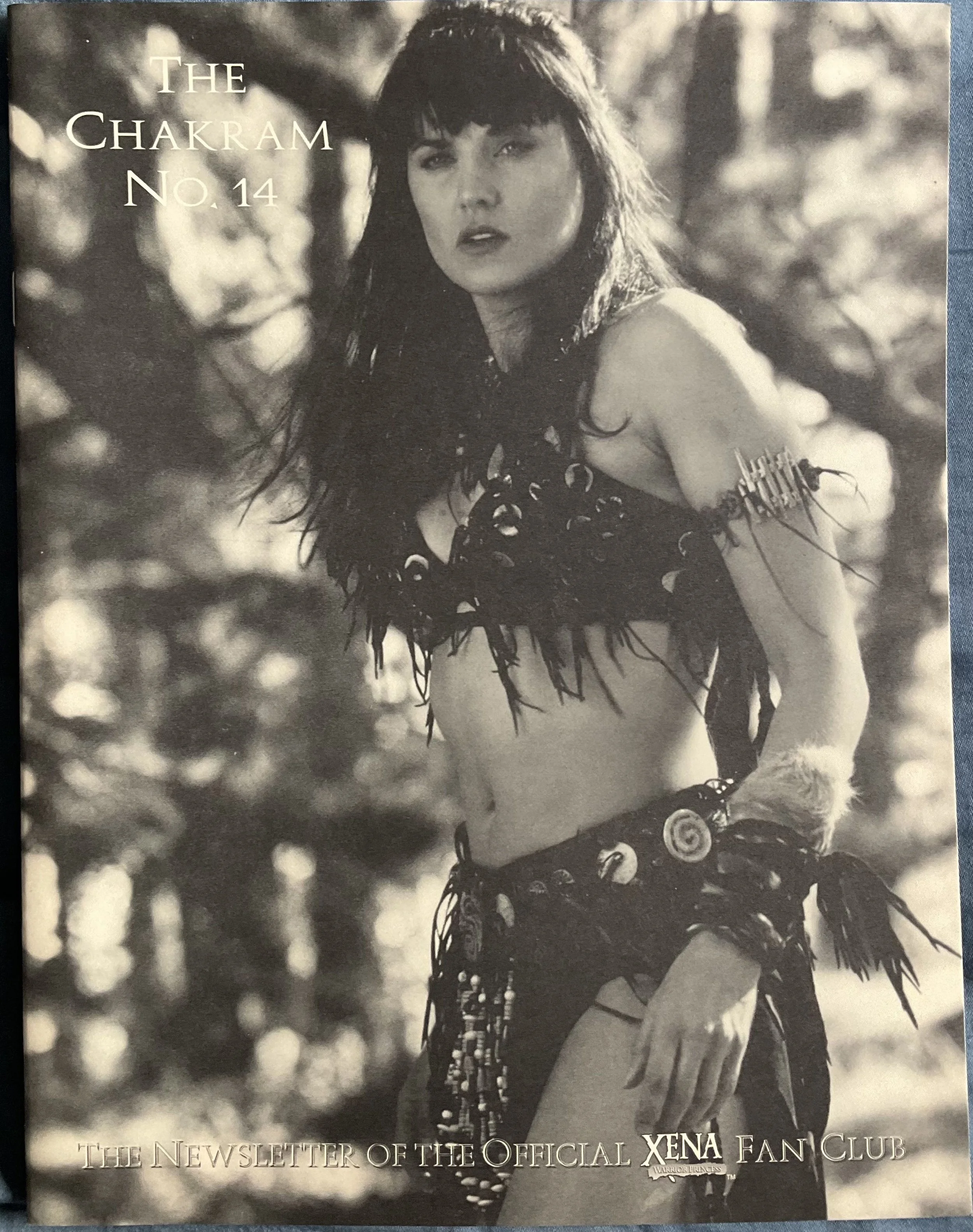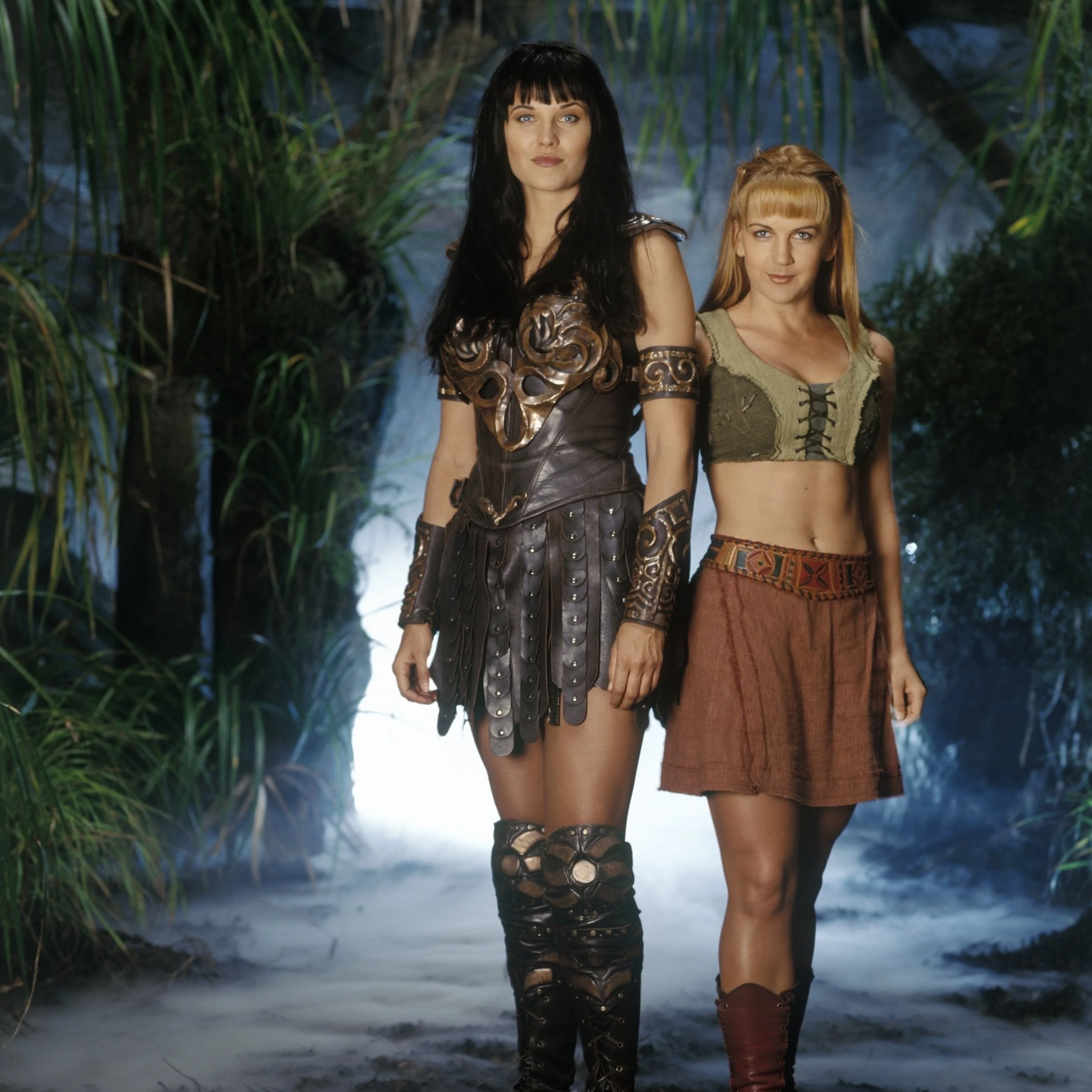Looking Death in the Eye
written by Carl Ellsworth
The Chakram Newsletter: Issue 14
SD: So here we are looking death in the eye. When we talked last time about “Antony & Cleopatra,” you mentioned you were looking forward to talking about “Looking Death In The Eye.” You said when you started writing the episode there was a particular structure you wanted to use. What structure was that?
Carl: I wanted to bookend the main story with the parts concerning the older Joxer. That style is reminiscent of many movies. For instance, Titanic used the Gloria Stuart character talking about her memories of being on the ship when it sank. I suggested that part of the structure because I thought that's where a lot of the emotions were. And also some of the surprises.
I thought one of the emotional stories we were going to be telling concerned Joxer and his relationship with Xena and Gabrielle. Since we were planning on propelling Xena and Gabrielle forward 25 years into the future, I thought it would be a neat idea to bookend this episode with a tease of that. This would start the episode off with the shock of a very old Joxer. I wanted to start off in the bar with Joxer and hope the audience would be asking themselves. “Why is he old? What's going on here? What's happened?” And then to come back to him at the end also gave us the chance to fill in the blanks of the story.
SD: That way you wouldn't be giving away Xena's plan as it played out?
Carl: Exactly. It gave me the latitude to tell the rest of the story the way I wanted to. I've always been a fan of movies where you think you’re seeing what you’re supposed to be seeing and in the end everything is turned upside down. Then you realize you were seeing with your eyes, but were you paying attention? One of my favorite movies that used that technique was The Shawshank Redemption. You go through the entire movie thinking the Tim Robbins character was ready to give up and all along he was digging the tunnel.
SD: Joxer served another purpose for me. If he hadn't been there, the emotional impact of the death of Xena and Gabrielle wouldn't have been as strong.
Carl: Right. He was indeed left out of the plan. He was a part of it when Gabrielle goes into the tavern presumably to get him away from the gods to keep him out of danger. We talked about whether or not it was right to leave Joxer out of the planning. We decided in the end they had to do it because Joxer would have blown the whole thing. That’s the type of character he’s been portrayed as all along.
SD: Joxer has been known to blurt out things that got Xena and Gabrielle in trouble. Could they really depend on his acting skills - would he have been able to play along with their being dead?
Carl: Xena and Gabrielle also needed Joxer convinced they were indeed gone. Realistically, they just couldn't include him for what they were planning.
SD: Was this the episode where it was decided that Meg and Joxer would be married?
Carl: Yeah. It started off as a joke, but then we decided, why not.
SD (laughing): In your head, was it a happy marriage?
Carl (laughing): I think it probably started off happy, but twenty-five years later ... he has to retreat to the bar. I think they’ll stay married, but they need their space.
SD: The jump into the future was to get rid of Xena’s baby daughter, Eve, yes?
Carl (laughs): Yes.
SD (laughs): It's okay to say that. Lucy recently gave an interview where she said, “Once you have a baby on a show, you've gotta 86 the baby cause they’re so painful to work with.” Were there any other thoughts about how you might “age” Xena’s daughter quickly?
Carl: At first we thought it would be more of a supernatural event - a god-caused phenomenon. At one point there was talk of doing it much earlier in the story as the result of some type of time travel vortex Xena and Gabrielle would be caught up in.
SD: Earlier in the episodes or earlier in this particular story?
Carl: In this episode. This came up when we were tossing around ideas of how to go about it. And always part of the thinking in the writers' room is how can this be more of a result of Xena's plan than via some supernatural act?
SD: So that Xena isn’t simply a pawn?
Carl: Yes. The running theme in our discussions was that Xena has been on the run, she realizes that the gods are just too powerful, they're on her tail every second and the best way to buy some time would be to fake Eve's death. And to fake Xena and Gabrielle's deaths too. To get back on the offensive, they needed to disappear and have a chance to regroup. That took us in the direction of Xena’s plan. I think it was Rob (Tapert) who said, “I want Xena to capture Death.” That's what launched us in that direction and made this story the first part of the older Eve arc.
SD: There was a lot of talk about seeing Celesta, Death, come back and all the references from her previous appearance in the first season episode “Death In Chains.” Had you seen that show?
Carl: I watched it a couple times and read the script. I wanted to become more familiar with the mythology they had established regarding that character. We talked about the question of would Xena really do this? By capturing Death, all the things that were brought up in “Death In Chains” would come about. For instance, you condemn eternal suffering upon innocent people as well as the bad guys. But it's only temporary and the thought was that Xena would do this for her child.
SD: She would condemn the world to eternal suffering for her child?
Carl: Yes. (laughing) Well, only for one act of the show.
SD: Knowing that it would be temporary?
Carl: Right. But we also wanted to handle that question as delicately as we could because that wasn't the focus of the story.
SD: Was it difficult coming up with a way for Xena to make Celesta cry?
Carl: It took about three drafts and two weeks to come up with a scenario where she would cry. I was bouncing that scene off everyone. Rob kept saying, “We're not there yet. We’re not getting to the tears.” It's ironic that I came up with the idea of drinking her tears and, therefore, knew I would have to make her cry. And then that turned out to be the toughest part of the story.
SD: What could you say to Death to make her cry?
Carl: Yeah. One of the first ideas was Xena talking about her daughter and not wanting to lose her. She wants to be able to see Eve grow up after not having that opportunity with her son. Relating that to Celesta's inability to have children. That was one of the ideas. But then we hit on using the fact that Celesta has a brother, Hades, and the relationship she has with him and connecting that with Xena’s feelings about her own brother. Also Xena and Celesta have both been outcasts. Lucy ad-libbed some lines in that scene that really drove it home. It turned out fabulous.
SD: How did Ares come into this story?
Carl: The question was what would be Ares' role given the fact that he fought alongside Xena in “Amphipolis Under Siege”? Where does he stand with the gods now? We wanted to address that. His major part in the story doesn't come until the end which we imply was the one thing Xena and Gabrielle couldn't predict - his intervention in their deaths. I'm not sure what the viewers thought Ares’ feelings were toward Xena, but it sure is answered in the final scene where he’s standing over their coffins. He is truly in love with Xena. And we wanted that point to be made clear with this episode.
SD: Xena to Haephestus: “So if you're the god of arts and crafts, what do you do for a hobby?” And Ares to Xena in the coffin: “When you sacrificed yourself for others, you were hers. But when you kicked ass, you were mine.” Couple of good one-liners.
Carl: Coming into the show, one of the first things I picked up on when I was watching the episodes were the humorous one-liners and the shtick between the characters. I enjoyed that and was glad to be able to include lines like those in the scripts.
SD: I guess by now you've come to realize that the fans spot everything. For instance, Xena visits the Fates in the opening teaser, but she's got a wound on her arm from the fight scene with Athena in the forest that follows. Were the scenes reversed after being shot?
Carl (laughs): They did switch them. When I saw an early cut of the show and it started out with Xena walking into the Temple of the Fates, I was surprised. That wasn't the first scene in the script. Originally, the episode started with Joxer telling the story to his kids and then dissolving to the past and Xena and Gabrielle's confrontation with Athena. We thought that was a good teaser out. That's the way the episode was filmed as scripted in the shooting draft. The decision to bump up the Fates scene to the teaser was a post production decision made by Rob that I thought worked really well. They then had to make some adjustments to the Joxer story to make it all fit. Xena does, however, carry the wounds from the fight which she hasn't yet had.
SD: I was surprised people noticed it because the wound wasn’t on the camera side of her body. You had to look close to see it, but people did.
Carl: The change did result in a continuity error, but I think the new teaser out of Xena saying, “I'm gonna die, Gabrielle. It's the only way,” is, hands down, more effective.
SD: The dialogue in the Fates scene also recapped the previous events that led to this episode.
Carl: The Fates say, “Only in the essence of death can the child find salvation and the Twilight (of the Gods) be set in motion.” We padded that line with Gabrielle saying, “You're not listening to them. You have said we always determine our own fate.” But essentially the Fates are telling Xena where to take her thinking. That is where Xena's plan is set up worded in such a way to make us think the only way out is for Xena to die.
SD: The key is in the word “essence” of death.
Carl: Right. And I'm amazed that people spotted that wound. (laughing) Also, here's another footnote about why we had scripted those scenes the way we did originally. The battle with Athena gave Xena a reason to go to the Fates. But with Xena being painted further and further into a corner with the gods constantly being after her, that worked as a reason for her to go to them as well.
SD: By the way, where did Haephestus fall when he went into that pit? He popped out of it and showed up later.
Carl: He did, he did. (laughing) He had a long fall down, but he's a god. So eventually he just dusted himself off and made the long climb back up.
SD: We also saw the return of Hades’ Helmet of Invisibility which was introduced in the first season episode, “Mortal Beloved” and was used again in “God Fearing Child” in the fifth season.
Carl: I was stuck on that for half an afternoon. It was no easy challenge for Xena and Gabrielle to run into Athena and Hades and then have to escape from them. The Helmet of Invisibility gave me an out. It was presumably crafted in the supernatural realm so if we break it up and shatter it, the pieces will scatter onto the gods to buy time for Xena and Gabrielle to get away.
SD: Being held by their own power?
Carl: Exactly.
SD: How did you know about the Helmet?
Carl: I had read the script for “God Fearing Child” and thought it would be cool to see Hades wearing it.
SD: With gods as the bad guys, they are basically undefeatable. And yet Xena has to win. Thunderbolts, Artemis' arrows - it seems a difficult scenario.
Carl (laughs): Well, in this one, hopefully, the fans were not disappointed when the gods finally get all their weapons together and they do hit the wagon.
SD: All the arrows shot at Xena and Gabrielle miss, but when Gabrielle throws her two sais, she takes out two of Artemis’ archers! But it's exciting.
Carl (laughs): When we began to see the raw footage of the episode and how they were staging the wagon chase and the cliff overlooking the ocean, it was unbelievable. Just one of many examples of whatever you can put on paper. Renaissance is usually able to deliver.
SD: Xena's plan was to drink Celesta’s tears. So why did she threaten to stab herself with her sword? And how could she know Ares would appear to stop her?
Carl: To further drive the point home (no pun intended). Xena's standing on the beach supposedly looking at her dead child and partner. The gods are on top of the cliff looking down. The plan is to convince the gods Eve is dead and she has no more reason to live. Xena knows Ares has been keeping an eye on so she's banking on him popping in and stopping her. If she convinces him she's dead, she assumes that will convince the other gods.
SD: One might say that it’s easier for the gods on the hill to see a sword than a small bottle, too.
Carl: True. It makes a good visual for the gods and the audience. It's a very serious move. Luckily, Ares comes along and knocks the sword out of her hand.
SD: What the gods saw was Ares’ response to her drinking the “poison.”
Carl: And when she drank Celesta's tears, Xena “died.” The gods sensed that. You'd have to say we made up that rule because we needed it for the story. By drinking the tears of death, you in essence simulate death. We didn’t want the rubble. We had the gods believing in Xena’s death because of Ares' actions.
SD: They may have thought Xena was dead, but the gods didn't go to check her “lifeline” with the Fates to see if it was still intact.
Carl: Ah, right.
SD: Was there any discussion of that?
Carl (laughs): Never.
SD: But I didn't notice the Fates jumping up to point that out. Maybe they’re not part of the team.
Carl: One of the points I wanted to make in the Temple scene is that the Fates don't necessarily pull the strings. That's why I had Gabrielle say, “You have said we always determine our own fate. It's not written for us.” And Xena responds, “I still believe that... so do they.” They can foresee future events, but they don't have the final say.
SD: I’ve been thinking of the Fates as part of the gods' family. But I guess that's not true?
Carl: In the mythology of the series, I'm not sure where it's going to end up, but in this episode, it was my intention to separate them from the gods. That they act on their own even to showing Xena a way out. But leaving most of it for her to figure out for herself.
SD: It was fun seeing Gabrielle being the bard again. Even as she was riding in the back of the wagon about to go over the cliff!
Carl: Yes. We have to explain how all these stories came to be. Gabrielle was writing even under the most dangerous circumstances. I first pitched the idea of Joxer reading her scrolls as part of the episode. Then we had the scroll pop out of her hands when they go over the cliff so that Joxer could find it and know what they had been up to. But it wasn't discovered until 25 years later.
SD: Were there any scenes that didn’t make it into the final cut?
Carl: The one that comes to mind was at the end when Ares was in the ice cave with the bodies of Xena and Gabrielle. We cut away to Octavius in a tent with baby Eve. He picks her up and is telling her it’s okay, you're safe with me. A foreshadowing of what was to come. It's always a shame when things have to be cut for time. For me that was just as ominous a prospect as Xena and Gabrielle on ice. The fact that they've mistakenly been entombed and the future leader of the Roman empire is taking care of Xena's daughter.
SD (sarcastically): Xena just loves Rome and all it stands for.
Carl: Right. I'll read you the scene:
Interior tent. Octavius as he enters makes his way to a cot where Eve watches him with a smile. Octavius scoops her up and cradles her. “Hey there, little Eve. Your mom’s not here, but she made sure those nasty gods aren't going to be looking for you anymore. So you want to stay a while? After all, I owe it to her.”
It gave the episode an eerie feel to have Eve in Rome's arms.


